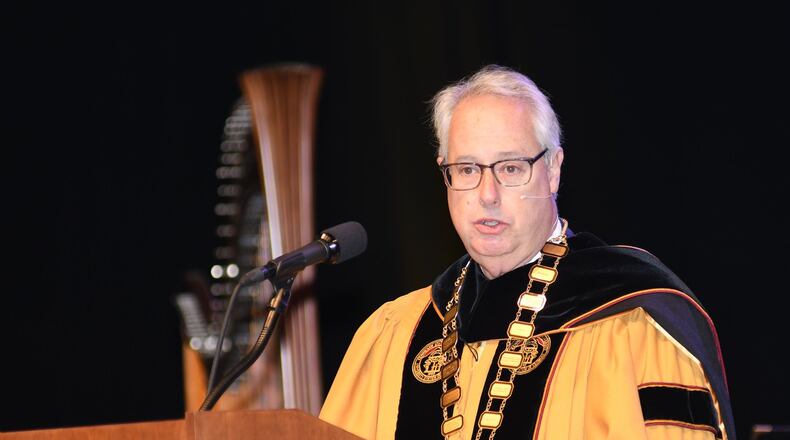A group of Kennesaw State University cheerleaders said they felt vindicated Wednesday after president Sam Olens rescinded a controversial change that some worried violated the students’ free-speech rights.
“This announcement is a victory for justice and social progress,” the cheerleaders said in a statement.
KSU has been under the national microscope since five African-American cheerleaders took a knee during the anthem before the football team's Sept. 30 game and the university's decision days later to keep all cheerleaders off the field during the anthem. The kneel down is part of an effort, which began last year with some pro football players, to bring awareness of police misconduct and racial inequality.
“While I believe there are more effective ways to initiate an exchange of ideas on issues of national concern, the right to exercise one’s freedom of speech under the First Amendment must be protected,” Olens wrote in a one-page letter to students, faculty and staff.
Olens had no additional comment, a KSU spokeswoman said.
KSU has said the change to the pre-game program in October had nothing to do with the decision of some cheerleaders to kneel during the anthem. However, Cobb County Sheriff Neil Warren boasted in text messages to state Rep. Earl Ehrhart that they had persuaded Olens to find a way to keep cheerleaders from continuing such protests. The Georgia Board of Regents is conducting a special review of how KSU responded to the cheerleaders' actions.
Warren declined an interview request Wednesday. Efforts to contact Ehrhart were unsuccessful Wednesday afternoon.
University System of Georgia officials said in a statement Wednesday that KSU and its other institutions cannot prohibit or interfere with how students express themselves during the anthem, citing a four-page letter of guidance from the state attorney general’s office.
“While we respect the First Amendment rights of individuals, it is the University System of Georgia’s belief that everyone should stand to honor the National Anthem,” the USG statement said. “However, the Office of the Attorney General of Georgia has advised that the First Amendment protects students who kneel or sit during the National Anthem.”
While some of the cheerleaders were relieved by the announcement, others had questions about its timing and rationale, said Davante Lewis, who’s acted as a spokesman for the five cheerleaders.
Lewis said Wednesday’s announcement was political.
“I think this is a face-saving campaign because President Olens’ job was at risk and the credibility of the institution was at stake,” he said.
Lewis, a brother of one of the cheerleaders, said they will kneel on the field during the anthem when KSU has its next home game Saturday afternoon. Lewis said he’s worried the cheerleaders will be pressured not to kneel on Saturday since KSU is celebrating Military Appreciation Day.
Lewis said he’s waiting on Olens to meet with the cheerleaders.
Olens and KSU officials have received scores of emails and telephone calls since the cheerleader protest went public. The controversy has come at a time of heightened sensitivity over race relations, patriotism and freedom of speech. It also highlights a widening divide between a traditionally conservative community that is growing more diverse and the campus culture of a rapidly-growing university of nearly 36,000 students, third-largest in the state.
Olens, the former Georgia attorney general and Cobb County commission chairman, was criticized by some as caving to pressure from longtime, politically powerful friends who opposed the cheerleaders’ actions. Wednesday’s announcement may bring criticism that Olens has now bowed to pressure from those who opposed the prior change.
Some students have held protests on campus in recent weeks, demonstrating against the change and other academic issues, such as Olens’ recent decision to remove the phrase “social justice” from some faculty job descriptions. KSU’s Faculty Senate has invited Olens to a meeting Friday to discuss some of these issues, but he’s so far declined, said Susan Raines, a KSU conflict management professor.
The five KSU cheerleaders began talking in mid-September about kneeling during the anthem. They paid attention to the year-long debate over some NFL players — beginning with former San Francisco 49ers quarterback Colin Kaepernick — getting on one knee during the anthem to raise awareness about police brutality and racial inequality. President Donald Trump said the NFL should fire players who kneel.
Since KSU's change, the cheerleaders who've knelt during the anthem have continued to do so in a tunnel under the stadium.
The Lawyers’ Committee for Civil Rights Under Law, which had been pressuring the Board of Regents in support of the cheerleaders, said Olens’ announcement was a victory for free-speech rights. Some longtime KSU supporters, such as Bob Best, said while the First Amendment grants cheerleaders the right to kneel, it is also the rights of residents “not go to the games and to withhold any contributions to the university.”
Olens ended his letter by saying he hopes the situation “will produce a constructive dialogue that leads to a greater recognition of and respect for all opinions.”
Staff writer Meris Lutz contributed to this article.
About the Author
Keep Reading
The Latest
Featured

